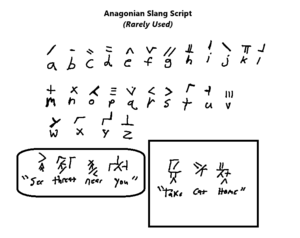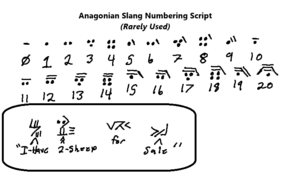Anagonian Slang Script & Language
Though Modern Anagonian is widely used in urban centers and formal settings, a more informal, rural variant known as the Anagonian Slang Script persists in the remote regions of Anagonia. This script is primarily used by those living in the "boonies" or "backhills", far from the influence of urban education centers. Any Anagonian, regardless of race or background, who grows up in these rural areas and receives even the most basic education will be familiar with this script.
The Anagonian Slang Script is a fusion of Old Draconic Script and Modern Anagonian, but with a notable difference: it adheres to the traditional Draconic writing rules, such as structuring words in rows and columns, often written vertically or in block patterns, as opposed to the linear, left-to-right format of Modern Anagonian. This gives the script a rougher and more ancient appearance, reminiscent of the older days when the Draconic Script dominated written communication.
The language that accompanies this script is equally rough and reflects the informal, rural dialects of ancient Anagonia. In many ways, it can be considered Anagonia’s version of "southern slang," where pronunciation is less refined, words are abbreviated or slurred, and sentence structure is more flexible. This slang often invokes older phrases, expressions, and metaphors that have long since fallen out of use in urban centers but remain popular in rural regions.
Anagonian Slang Audio Clip Example
Mathematical Slang Script Variant
In addition to the language itself, there is also a rudimentary form of mathematical slang script used in rural areas. This variant still follows the basic principles of Draconic mathematics, incorporating simple symbols and markings to denote numbers. However, in keeping with the informal nature of the script, these markings are often abbreviated, with symbols for multiplication, division, and addition simplified to slashes, dots, or crosses.
This mathematical slang is only suitable for basic arithmetical operations, such as counting, trading, or simple transactions within local communities. More complex calculations are seldom needed, and when required, individuals from these rural regions often turn to the standardized Modern Anagonian system for precision.

